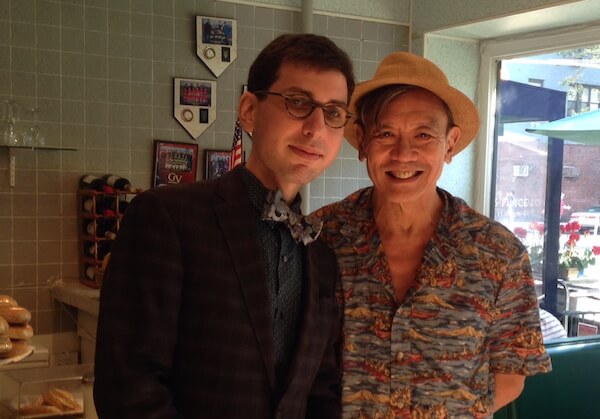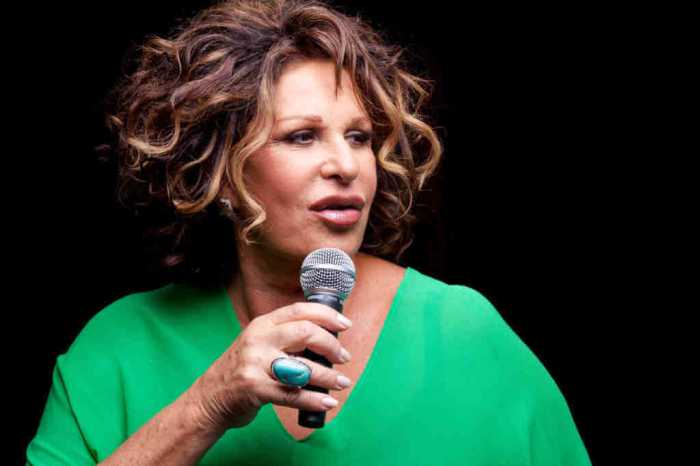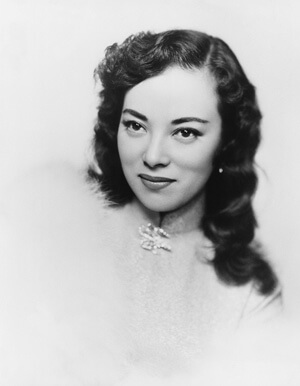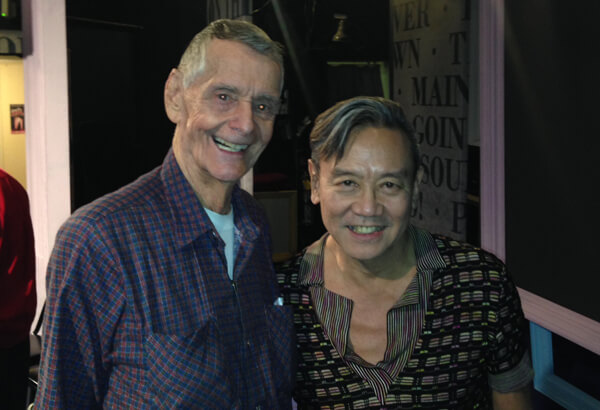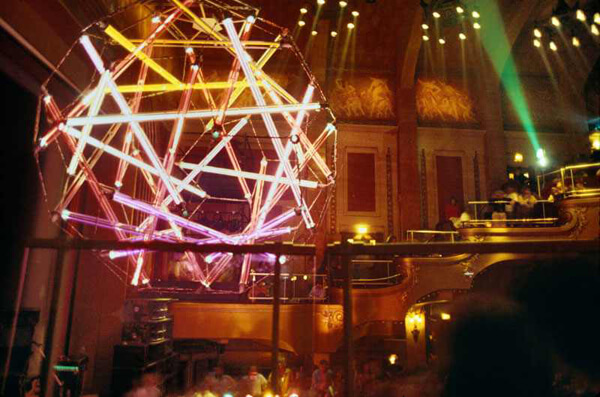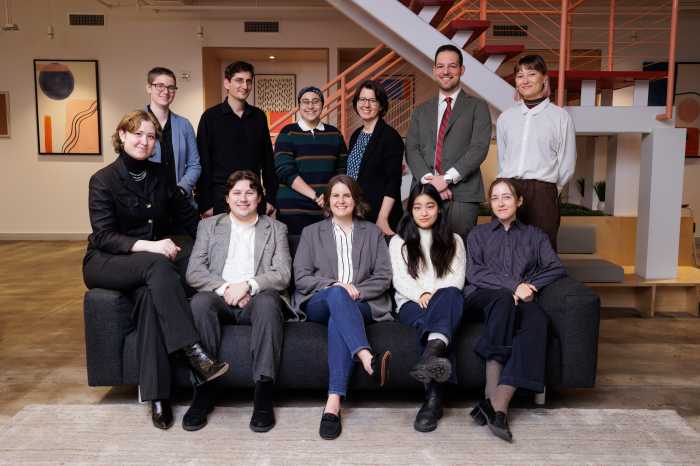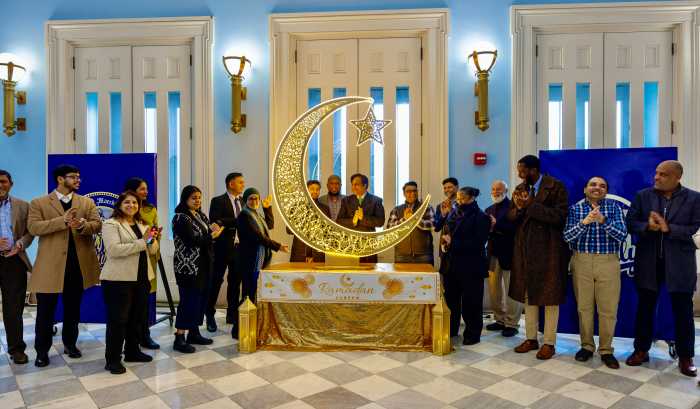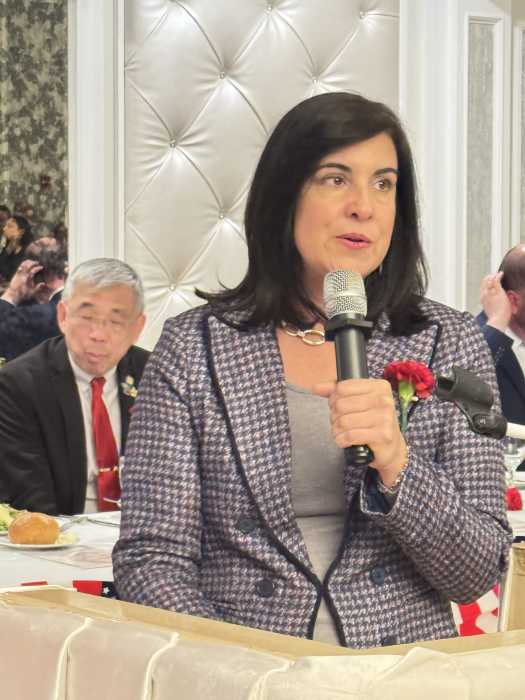Aaron Weinstein, a violinist and raconteur of astonishing talent. | AARONWEINSTEIN.NET
I’ll come right out and say it, although he’d hate it: Aaron Weinstein is a genius. The first time I saw the musician enter a stage — the ultimate long, lean, bespectacled, bow-tied, and quite adorable nerdling — whip out his violin, and proceed to share his intense, elegant, and drily witty love affair with the Great American Songbook, I knew I was in the presence of a truly original artist, not to mention completely hooked.
It took me a while to catch him in a full show — not one of his typically sparkling guest appearances as one among a roster — but that finally happened on my birthday in July at Pangea in the East Village. Along with cabaret’s premiere piano accompanist, Tedd Firth, and a Bobby Short-eulogizing Linda Lavin, he filled that intimate parlor of a club with music and ultra-smart patter entirely worthy of that Kay Thompson accolade — pizazz. A nimble virtuoso on not only the fiddle, but also the quite wonderful and rare mandolin, Weinstein as well happens to be the drollest and most surprising of comedians, and you can easily see that his literate, super-dry, and sometimes downright bizarre verbal accompaniment is every bit as much of a drawing card to a devoted following.
For me, the arresting highlight of the set was his string arrangement of songs belted by the theater character he most aspires to play, Mama Rose in “Gypsy.” As his pale, divinely etiolated fingers flew about the fretwork, uncannily drawing out every musical — and lyric — value possible, in a way to evoke Merman, Lansbury, Peters, LuPone, and Weinstein (but definitely!), I thought, “Holy crap, his violin sings!”
IN THE NOH: Aaron Weinstein wields a violin that sings, not to mention a a rapier wit
We finally met for one-to-one sitdown on a brutally hot afternoon at the Hudson Diner, where he greeted me from a back booth. Covered in sweat from a two-block walk, sartorially, I was basically Mr. Hawaii, but Weinstein, ever true to formal form, was a haberdasher’s idea of heaven, in his natty navy and gray ensemble, consisting of signature bowtie, button down shirt, and I swear to God, a wool sports jacket. Our paths had crossed before, when we were guest judges at the Metrostars annual cabaret competition, and, champing at the bit to discuss a favorite subject with a real aficionado, I’d made the severe faux pas of asking this sheet music connoisseur what his favorite songs were.
The subject came up again when we were discussing another droll violinist, Jack Benny, and Benny’s suave theme song, “Love in Bloom.”
“Benny could play better than he let on,” Weinstein observed. “Bob Hope said, ‘Jack Benny is a great violinist. And I am a great actor. And it takes a great actor to say that Jack Benny is a great violinist.’ That song was written by Leo Robin. It’s actually a very good song, although he never made it to the bridge.
“I say that I have no favorite songs — or composers — because it is the right thing to say, just like the right thing to say is ‘I have no favorite children.’ But, of course, every parent has a favorite child and everyone actually has favorite songs. Really, for me, it’s all about the performance. I mean, there have been second-rate songs that have been handled brilliantly. Also, there have been essentially perfect songs that have been performed in a way that would make you never want to hear them again. And I can’t honestly say that anyone is the best. Ranking in that way turns music and performing into a kind of athletic event. Not my bag. But you mentioned Judy Garland… well, there was no one better.”
I adore talking to talents who have a deep love for what they do, especially a special one like Weinstein, who has such a fully formed aesthetic and compellingly authoritative take on things. I wasn’t sure, at first, if he’d be this pretentious, willfully eccentric time warp sage, oozing attitude and judgmental about others’ perhaps differing tastes. Not so at all: he actually asked if I was sure I wanted to interview him, and said he didn’t want to be a disappointing subject and thought he might be. That very uncertainty clinched the genius — or, at least, true artist — idea of him for me, and bespeaks the melting sensitivity which informs his beautiful playing.
Our two hour-plus interview encompassed everything from the living hell that cabaret can be, living legend drummer Warren Vaché, Garland’s “A Star is Born,” and Dick Cavett’s ego to perhaps my favorite singer, Lee Wiley, and the brilliant Tedd Firth.
Even if I may be unfamiliar with or none too enthusiastic about some singer I am going to see, the minute I see Firth’s slightly saturnine mien over the keyboards, I smile, knowing that, whatever the grade the vocalist may be, I am assuredly going to hear some fine music.
Weinstein said, “He is amazing. Again, I will not say he’s the best anything, but I will say there is no better pianist. Aside from the brilliant musicianship, there is no drama: he shows up on time, always with a positive and easy attitude. The absolute musician, he tolerates me, and I like that. One of the things I really value is that he is a great reader with the fairly intricate arrangements I do. At sound check, we run through it one time and that’s it. He is able to do anything, and his limits are only those of my imagination. No wonder he is so in demand.”
 I mentioned to Weinstein how much I enjoyed his between-songs patter, delightfully absurdist, often cryptic, and, at times, toweringly pretentious. Deeply thoughtful about everything, Weinstein told me, “I have, at times, been called a cabaret performer. But I don’t really understand the term. I think it’s a bit of a catch-all, like calling something ‘world music.’ It’s a label that doesn’t actually describe very much.
I mentioned to Weinstein how much I enjoyed his between-songs patter, delightfully absurdist, often cryptic, and, at times, toweringly pretentious. Deeply thoughtful about everything, Weinstein told me, “I have, at times, been called a cabaret performer. But I don’t really understand the term. I think it’s a bit of a catch-all, like calling something ‘world music.’ It’s a label that doesn’t actually describe very much.
“But I suppose, in the broadest sense, the core of cabaret is about a performer communicating with an audience in some way, which can often lead to shows with a fair amount of talking. And at its best, you get something like what Steve Ross would do at the Oak Room or ‘Elaine Stritch At Liberty,’ for that matter.
“But at it’s worst, you have what I personally try to avoid — which is to take advantage of an audience that’s probably there to enjoy some nice music. And when I say ‘take advantage,’ I mean to hold an audience hostage with personal anecdotes that should be heard only by one’s therapist.
“I once saw a show where someone spoke for what seemed like days about going to their Grandma’s house for tea every week and how Grandma got sick and died and then the funeral, and it was all a lead in to the song ‘When I Take My Sugar to Tea.’ And I’m just thinking, ‘Did they really think that story did anything for our understanding or enjoyment of the song? Or was that just an exercise in narcissism?’ I mean, maybe I'm missing something but Nat Cole sang that same song without any preamble, and it was pretty great.
“In fact, all the giants — Ella Fitzgerald, Mel Torme, Sarah Vaughan — um, I’ll include the instrumentalists, too, like Stan Getz and Zoot Sims — they’d do a whole evening without speaking very much, if at all between songs, and you could make an argument that all of that was cabaret because they were certainly communicating and connecting with an audience. It’s just that everything they had to say was done in the music.
“But there is something to be said for good material. I mean, when I’ve played with Annie Ross, she would always sing ‘Lush Life’ and introduce it by saying something like, ‘Here’s a Billy Strayhorn song that Billy taught me when we were both living in Paris.’”
I also got Weinstein to talk about his inimitable sartorial style.
“Why do I wear bowties? Well, because I’m a bow tie rights activist. As far as clothing in general, Dick Cavett once asked Diana Vreeland, ‘Do clothes matter?’ And she said something like, ‘Clothes should only matter to the person wearing them.’ And that’s kind of how I feel. I mean, I’m going to dress the way I want. But I don’t really care how other people dress. Moreover, I think dress codes are absurd. Why not just announce the event and let everyone dress in a way they personally feel appropriate for that event.”
Coming out was not really a problem for Weinstein.
“I had hippie parents, who would show us films like ‘A Clockwork Orange’ and ‘Pink Flamingos’ [laughs], although while I remember being able to watch Divine eat the dog shit, I wasn’t allowed to see the guy fucking the chicken. I didn’t come out until I was in my early 20s. I sat my parents down and told them, ‘Before I tell you anything, be very careful to gauge your reactions, so as not to embarrass yourselves.’”
That sounds just like Weinstein.
“When my mother found out I had a boyfriend, her first words were, ‘Is he Jewish?’
“Regarding being gay, as I think I mentioned, I just didn’t see a need to send out a press release about it because I don’t see how it’s relevant to what I do as a performer and musician. But then again, I don’t post pictures of my lunch on Facebook, either, so maybe my info sharing sensibility is a little conservative.
“But saying I’m a jazz musician or specifically, a jazz violinist — that makes sense to me. I mean, I play jazz on a violin. But tacking on something about sexuality seems kind of goofy. And maybe for some people, it’s immensely important. But as I see it, and this is just me, to say someone’s a gay jazz violinist — does that mean they play gay jazz? Perhaps with gay musical notes? I mean, if that’s the case, I’d like to hear what a homosexual C-sharp sounds like.
“This speaks to a larger issue and it’s the reason I’m bothered when I see these jazz festivals pop up that feature, say, only women, or a friend of mine told me about a jazz festival in Europe that featured only Jews. And, actually, I think there’s a jazz fest in Philly that features only gay musicians. And I’ve no doubt that great music is being made at all these events. But the concept seems a little strange to me and a bit at odds with jazz itself because, at least ideally, the identity of the person holding the instrument shouldn’t matter. All that matters should be the music coming out of that instrument. Benny Goodman kind of showed us that in the ‘30s when he integrated his band with Teddy Wilson and Lionel Hampton.”
The time I spent with Weinstein was wonderful, only slightly marred by my techno-ineptness that left me with no space remaining on my digital recorder and no clue as to how to erase old material to make room. Weinstein remained cool as a daiquiri as I frantically ran next door to the Korean stationery shop for a pad and pen with which I old-school scribbled his words. Ever the perfectionist, however, he did send me this email follow-up:
“Have you found your decoder ring to read those pages of legal pad notes? I often get little nervous about that. I once talked to someone who was scribbling away and then when the thing was printed, I learned all sorts of interesting facts about myself, like my father was an ethics professor at the University of Chicago (I mentioned going to an event at U of C with my father) and that going to Israel was the most meaningful trip I’d ever taken (I’d mentioned being there for a jazz fest and having delicious seafood). 🙂
“I just wanted to clarify what we discussed about the idea of talent. I’m not sure how well I articulated it. But what I was trying to say is that I feel that the word ‘talent’ is too often misused — maybe cause it’s misunderstood. But I hear people use the word as though it was a coveted prize that some people got and others didn’t — and it’s that idea that I disagree with because it gives no consideration to the work that’s needed to learn how to do whatever the so-called talented person is doing.
“And of course, it’s true that certain things come more naturally to some people. But to say that someone has talent — to me — what that really means is that they have the ability and a desire to sit in a space for a long, LONG time and figure out how to do their thing. I mean, I don’t know, it seems that people are not really supposed to WANT to spend an absurd amount of time working on one thing by themselves in lieu of actually being in the world with other humans. And I know there’s people who disagree with me on a lot of this. But it’s just my opinion.”
To keep tabs on where you can next catch Aaron Weinstein, visit aaronweinstein.net. Contact David Noh at mailto:Inthenoh@aol.comand check out his blog at http://nohway.wordpress.com.

